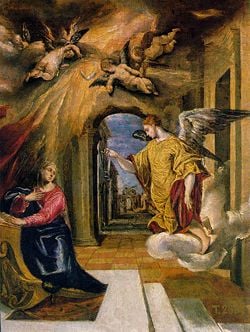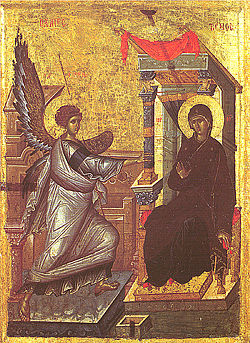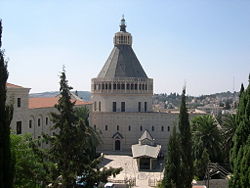Annunciation
 From Nwe
From Nwe The Annunciation, also known as the Annunciation to Mary, is the announcement or proclamation to Mary, the mother of Jesus, by the archangel Gabriel that she would conceive a child to be born as the Son of God. Annunciations were also given to several parents of sons in the Hebrew Bible, as well as to Zechariah, the father of John the Baptist in the Gospel of Luke.
Christian churches, particularly within the Orthodox and Roman Catholic traditions, celebrate the Annunciation to Mary with the feast of the Annunciation on March 25. Since it occurs 9 months before the birth (or Nativity) of Jesus on Christmas Day, the Annunciation also marks the actual Incarnation of Jesus Christ. The date of the Annunciation also once marked the New Year in some places in the Christian world, including England (where it is called Lady Day). The traditional location of the Annunciation is in the town of Nazareth, Israel. The feast of Annunciation has been celebrated since the fifth century C.E.
Annunciation in the New Testament
In the New Testament, the official account of the Annunciation to Mary is narrated in Luke 1:26-38 (NIV):

In the sixth month, God sent the angel Gabriel to Nazareth, a town in Galilee, to a virgin pledged to be married to a man named Joseph, a descendant of David. The virgin's name was Mary. The angel went to her and said, "Greetings, you who are highly favored! The Lord is with you."
Mary was greatly troubled at his words and wondered what kind of greeting this might be. But the angel said to her, "Do not be afraid, Mary, you have found favor with God. You will be with child and give birth to a son, and you are to give him the name Jesus. He will be great and will be called the Son of the Most High. The Lord God will give him the throne of his father David, and he will reign over the house of Jacob forever; his kingdom will never end."
"How will this be," Mary asked the angel, "since I am a virgin?" The angel answered, "The Holy Spirit will come upon you, and the power of the Most High will overshadow you. So the holy one to be born will be called the Son of God. Even Elizabeth your relative is going to have a child in her old age, and she who was said to be barren is in her sixth month. For nothing is impossible with God." "I am the Lord's servant," Mary answered. "May it be to me as you have said." Then the angel left her.
After hearing this words, Mary left immediately to the home of Elizabeth and her husband, the priest Zechariah. There she remained for several months, retuning to Nazareth visibly pregnant.
Annunciation in the Hebrew Bible
The Hebrew Bible, or Old Testament, records several annunciations. An annunciation was given by an angel to the Egyptian slave Hagar in Genesis 16:7-11 prior to the birth of Ishmael (Genesis 16:7-11). God himself announced the birth of Isaac to his father Abraham in Genesis 17:15-16. Rebekah, the mother of Jacob and Esau, receives a prediction from the Lord regarding the birth of her twins in (Genesis 25:23). In addition, an angel prophesies to the mother of Samson concerning the miraculous conception and birth of her son (Judges 13:5).
Finally, in Isaiah 7:14, a prophecy is given concerning the birth of a child called Immanuel: "Therefore the Lord himself will give you a sign: The virgin {young woman} will be with child and will give birth to a son, and will call him Immanuel." Christians see this prophecy as having been fulfilled at the time of Jesus. However, Jews insist that the context shows that Immanuel was born in Isaiah's day, since the prophecy was delivered to King Ahaz of Judah and was fulfilled while this king was still living (Isaiah 7:17).
Traditions concerning the Annunciation
Although the Annunciation is a key event to most Christians, the feast of the Annunciation has an especially important place in Eastern Orthodox theology, in which Mary is referred to as "god bearer." In addition, the feast of the Annunciation in the Greek Orthodox Church also marks a day of national celebration in Greece and for those of Greek descent, as it was on March 25, 1821, when Greece officially declared its independence after 400 years of rule by the Ottomans.
The date of the feast of the Annunciation is close to the vernal equinox, as Christmas is to the winter solstice. Because of this, the Annunciation and Christmas were two of the four "Quarter days" in medieval and early modern England, which marked the divisions of the fiscal year (the other two were Midsummer Day, or the Nativity of St. John the Baptist—June 24—and Michaelmas, the feast day of St. Michael, on September 29).
The first historical allusions to the feast are in a canon of the council of Toledo (656), and another of the council of Constantinople "in Trullo" (692), forbidding the celebration of all festivals in Lent, excepting the Lord's day and the Feast of the Annunciation. An earlier origin has been claimed for it on the grounds that it is mentioned in sermons of Athanasius and of Gregory Thaumaturgus, but both of these documents are now considered spurious by critical scholars.
A synod held at Worcester, England (1240), forbade all servile work on this feast day.
Two churches in Nazareth
As Mary was reportedly living in Nazareth at the time of the Annunciation, the place of the event has become a matter of some importance as well as controversy. There are two churches in Nazareth, each operated by a different Christian denomination, each believing their church to be the location of Gabriel's visit:
- The Basilica of the Annunciation: This is considered the most impressive architectural and artistic monument in the town of Nazareth. It is a Roman Catholic basilica, built over a crypt which encloses the Grotto of the Virgin where one tradition states that the Annunciation occurred. It is the latest of five churches on this site. The first was built in 365 C.E. by St. Helena, the mother of the Emperor Constantine I. The fifth, a Franciscan church, was dismantled in 1955 to make room for the present basilica which was completed in 1969.
- Church of St. Gabriel: This complex is composed of a church together with the site known as Mary's Well. Some of the New Testament Apocrypha indicate that the well was the actual location of the Annunciation. The church was completed in the middle of the eighteenth century by the Greek Orthodox Church.
In the late 1990's there was considerable tension between the Christian and Muslim inhabitants of Nazareth over a plan to build a mosque on a plot of land adjacent to both locations (though closer to the Basilica), but owned by a Muslim trust. In the end, the Israeli government advanced a compromise for the plot of land, a purported sacred burial site of Sha'ab El-Din, a nephew of Saladin.[1]
Annunciation in the Qur'an
The Annunciation to Mary is also cited in the Qur'an, in chapter 3 (Aal 'Imran) verses 45-51 and chapter 19 (Maryam-Mary) verses 16-26.[2] While these passages recognize Mary as the virginal young woman chosen to be the mother of the promised Messiah, they omit any reference to Jesus as Son of God, a doctrine contrary to Islamic doctrine:
(Remember) when the angels said: "O Maryam (Mary)! Verily, Allâh gives you the glad tidings of a Word ("Be!"—and he was!) from Him, his name will be the Messiah, 'Isâ (Jesus), the son of Maryam, held in honor in this world and in the Hereafter, and will be one of those who are near to Allâh. He will speak to the people in the cradle and in manhood, and he will be one of the righteous." She said: "O my Lord! How shall I have a son when no man has touched me." He said: "So (it will be), for Allâh creates what He wills. When He has decreed something, He says to it only: "Be!"—and it is.—Qur'an 3:45-47
She placed a screen (to screen herself) from them; then We sent to her Our Ruh (angel Jibrîl/Gabriel) and he appeared before her in the form of a man in all respects. She said: "Verily! I seek refuge with the Most Gracious (Allâh) from you, if you do fear Allâh." (The angel) said: "I am only a Messenger from your Lord, (to announce) to you the gift of a righteous son." She said: "How can I have a son, when no man has touched me, nor am I unchaste?" He said: "So (it will be), your Lord said: 'That is easy for Me (Allâh): And (We wish) to appoint him as a sign to mankind and a mercy from Us (Allâh), and it is a matter (already) decreed, (by Allâh).'"—Qur'an 19:16-21
Virginal conception
For many Christians today, the virginal conception of Jesus virtually hinges upon belief in an act of supreme obedience by Mary, beyond reason, beyond any kind of scientific theory or reality.
Other Christian writers hold that the verses in Luke 1:34:35, containing the account of conception through the Holy Spirit are interpolated or that the origin of the virginal conception derives from pagan myth and and heroic legends. Still others suggest that while the Annunciation may have taken place at Nazareth, the conception itself may have taken elsewhere. The Reverend Sun Myung Moon, for example, indicates that it took place at the home of Zechariah in the hill country of Judea, where Mary obediently traveled immediately after receiving the Annunciation. Reverend Moon identifies the father of her child—motivated indeed by an act of the Holy Spirit—as Zechariah himself.
Nevertheless, certain constants (of faith) remain among most Christians, in particular, as regards the Annunciation to Mary. Pope Benedict XVI stated: "The Annunciation is a humble, hidden event that no one saw or knew, except for Mary. But at the same time it is a decisive moment in the history of humanity. When the Virgin said ‘Yes’ to the Angel’s Annunciation, Jesus was conceived and with Him began a new era in history, which was eventually sanctioned by the new and eternal covenant.”[3]
Notes
- ↑ San Francisco Chronicle, Unrest in Nazareth; Christian-Muslim dispute over holy site tempers spirit of season. Retrieved December 13, 2007.
- ↑ Islamic Network, Quran, Aal-E-Imran, Chapter 3. Retrieved December 13, 2007.
- ↑ AsiaNews, Pope: the Annunciation, Mary’s and the martyrs’ “Yes” Vatican; Benedict XVI. Retrieved December 13, 2007.
References
ISBN links support NWE through referral fees
- Balay, Diane Huie. The Man from Nazareth: The Life of Christ from the Annunciation to the Resurrection in a Series of 24 Chancel Dramas. Abingdon Press; Spiral edition, 1997. ISBN 978-0687053186
- Braaten, Carl E. and Robert W. Jenson, eds. Mary, Mother of God. Wm. B. Eerdmans Publishing Company, 2004. ISBN 978-0802822666
- Editors of Phaidon Press. Annunciation. Amazon Remainders Account, 2000.
External links
All links retrieved October 30, 2021.
- The Birth of Jesus Foretold (Luke Ch.1 26-55) at Bible Gateway www.biblegateway.com.
- The Annunciation Icons (mostly Russian) www.icon-art.info.
- The Feast of the Annunciation BBC- Religion and Ethics-Christianity-Holy Days. www.bbc.co.uk.
- The Annunciation - Catholic Encyclopedia www.newadvent.org.
- The Virginal Conception of Christ by Jonathan Sarfati, CMI–Australia First published in: Apologia 3(2):4–11, 1994. www.creationontheweb.com.
Credits
New World Encyclopedia writers and editors rewrote and completed the Wikipedia article in accordance with New World Encyclopedia standards. This article abides by terms of the Creative Commons CC-by-sa 3.0 License (CC-by-sa), which may be used and disseminated with proper attribution. Credit is due under the terms of this license that can reference both the New World Encyclopedia contributors and the selfless volunteer contributors of the Wikimedia Foundation. To cite this article click here for a list of acceptable citing formats.The history of earlier contributions by wikipedians is accessible to researchers here:
The history of this article since it was imported to New World Encyclopedia:
Note: Some restrictions may apply to use of individual images which are separately licensed.
↧ Download as ZWI file | Last modified: 02/04/2023 05:04:21 | 12 views
☰ Source: https://www.newworldencyclopedia.org/entry/Annunciation | License: CC BY-SA 3.0
 ZWI signed:
ZWI signed:

 KSF
KSF